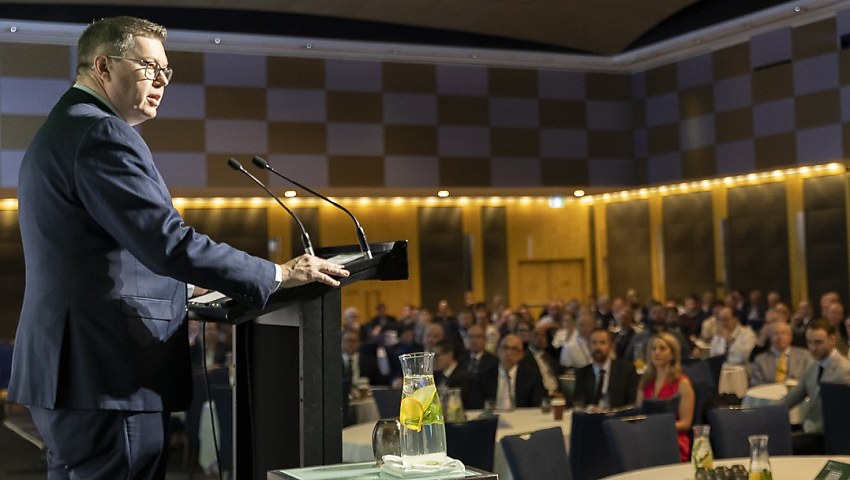Australia’s 10-year safety blanket is gone and the nation now faces the most challenging period since 1945, Minister for Defence Industry and Capability Delivery Pat Conroy said in recent comments.
To continue reading the rest of this article, please log in.
Create free account to get unlimited news articles and more!
The Minister for International Development and the Pacific spoke candidly with defence industry representatives at the Defence Connect Defence Industry Development Strategy (DIDS) Summit 2024 on 6 August.
Minister Conroy said the nation now faces seismic changes to keep pace with evolving challenges in the Indo-Pacific.
“The entire defence of Australia since 1945 has been based on us having superior military capabilities than our immediate neighbours and a 10-year warning horizon for a major conflict. That second part has evaporated. That means that we can’t rely on a 10-year warning, which means we have to act with urgency,” he said.
“We have to concentrate on accelerating delivery of capability as well as the long-term investments that we need. And part of that recognition by this government is both my elevation to cabinet and my new title.
“I’m no longer just defence industry; I’m defence industry and capability and delivery because that urgency has to be reflected in responsibilities.
“Obviously, my elevation to cabinet brings more resources to address both portfolios, which is obviously a good thing. But I think that it was a conscious decision by the Prime Minister to give me both. And I work very closely with Richard Marles as the senior cabinet minister in Defence and I think we’ve got a great team.”
Minister Conroy was promoted into federal cabinet under a series of ministerial arrangements earlier this year. Prime Minister of Australia Anthony Albanese announced the changes to the cabinet and to the ministry on 28 July.
Under changes to security and defence industry, former assistant minister for defence Matt Thistlethwaite has been moved to a role as assistant minister for immigration.
Luke Gosling was appointed special envoy for defence, veterans’ affairs and Northern Australia.
“We face the biggest strategic uncertainty since 1945,” said Minister Conroy, speaking at the summit on 6 August.
“We face the greatest arms build-up in our region since 1945. We face, as the National Defence Strategy said, a rising global power that hasn’t provided the normal strategic reassurance and transparency that you would hope from a global power. And we need to work through those issues.
“I’ve been a full member of the National security committee for cabinet for two years now and it is true, we face deteriorating strategic circumstances and it is the most challenging time since 1945.
“Even more challenging than the height of the Cold War… (because) this is the first time we’ve lost the 10-year warning.
“That was the safety blanket for governments of all persuasions, that knowledge that we had 10 years to gear up for a major regional conflict. That has gone and that requires a revolution in how we do defence procurement and how we resource Defence. And the DPM and I are leading that revolution. We’ve been backed by every member of the NSC, as demonstrated by that $50 billion budget increase.
“Over the decade in real terms, we’re increasing the Defence budget by 20 per cent in real terms. That is a massive increase in the budget and we’re increasing speed, because the whole government is focused on that.
“We’re focused on what we can do and we think that a 20 per cent real increase will deliver a much more capable Australian Defence Force than the one we’ve got now, as good as it is now.”
Minister Conroy reaffirmed his confidence in the AUKUS trilateral military pact with the United Kingdom and the United States.
“AUKUS is a multi-decade commitment by three countries and all three countries have committed to it because it’s all in our national interests,” he said.
“It enhances the defence of all three countries and it will outlast governments of all persuasions. It’s already outlasted two changes of government – one in Australia and one in the United Kingdom and it hasn’t missed beat.
“I would argue that AUKUS has been accelerated due to the change of government here. And in the United States there is a genuine bipartisan commitment to AUKUS. I’ll give you an example.
“I was in Washington for the vote on the four pieces of critical AUKUS legislation associated with the National Defence Authorization Act in December last year. That passed the Senate with an 80 per cent yes vote. It passed the House of Representatives with a 75 per cent yes vote. To get anything through the US system with an 80 per cent yes vote is a huge achievement and demonstrates the strong bipartisanship of this program.
“AUKUS enhances the three countries. This is about growing the collective industrial base of three countries so that we go in AUKUS Pillar I from having three submarine construction yards capable of building nuclear submarines to four. It’s about enhancing the defence capability of all three countries. It is genuinely in the United States’ self-interest and it also complements what we’re doing. So, I’ve got no concerns at all.”

 Login
Login







